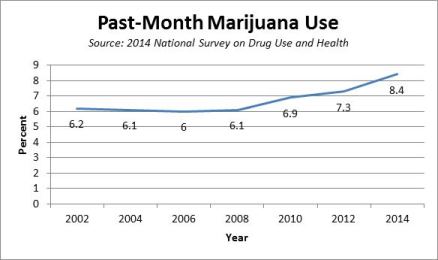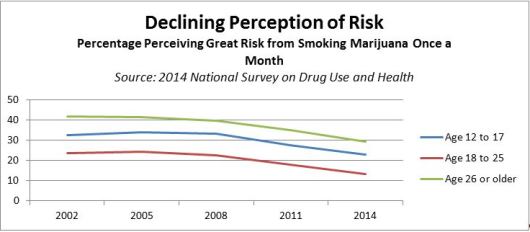
Page 4 of 4
Marijuana Use and Its Impact on Workplace Safety and Productivity
The number of people using marijuana in the United States is rising rapidly, and the impact of this increase is showing up at work. Drug testing services report more positive tests for marijuana, both in pre-employment drug screens and drug tests conducted for other reasons.
The penalty for a positive test is often a refusal to hire or, for those who are already employees, discipline up to and including termination. An employee familiar with state laws legalizing marijuana for medical and recreational use may be surprised by such a harsh workplace penalty, but employers continue to have good reasons for enforcing a strong substance abuse policy that includes a ban on marijuana.
Safety Issues
Safety concerns are often a company's primary reason for prohibiting marijuana in the workplace, and they are a valid basis for banning the drug. Marijuana use has been linked to an increase in job accidents and injuries, and the National Institute on Drug Abuse notes that the short-term effects of marijuana include impaired body movement, difficulty with thinking and problem-solving, memory problems, and an altered sense of time.
In May 2015, an article in the Journal of Occupational and Environmental Medicine concluded that there is a likely statistical association between illicit drug use, including marijuana, and workplace accidents. While some studies suggest that marijuana use may be reasonably safe in some controlled environments, its association with workplace accidents and injuries raises concern.
The impact marijuana use makes on transportation safety can be especially alarming. The drug impairs attentiveness, motor coordination, and reaction time and impacts the perception of time and speed. Studies from the National Institute on Drug Abuse have found that marijuana negatively impacts driving performance, and other researchers have found that acute use of the drug increases the risk of crashes and fatal collisions.
In addition, the National Highway Traffic Safety Administration reports that, since medical marijuana was legalized in Colorado in 2009, the percentage of marijuana-positive drivers involved in fatal motor vehicle crashes there has increased significantly.
Changing Attitudes
Issues with attendance and productivity also can arise from marijuana use, and morale may be impacted. Despite the safety and productivity risks associated with marijuana use, however, the drug is increasingly seen as socially acceptable and its dangers may be marginalized.
 Some of the social acceptance comes from the legalization of the drug under certain state laws. Marijuana can be used for medical purposes in 23 states, and can be used recreationally in four.
Some of the social acceptance comes from the legalization of the drug under certain state laws. Marijuana can be used for medical purposes in 23 states, and can be used recreationally in four.
The federal government's stance also makes an impact. Although marijuana remains classified as a Schedule I drug with no legitimate medical use and a high potential for abuse, the federal Department of Justice allows state and local agencies to enforce narcotics laws that are outside federal priorities. This gives states leeway to enforce some marijuana laws as they see fit and to allow the drug to be used under state law.
 Nationwide, use of the drug has increased dramatically. A survey from the National Institutes of Health found that past-year use more than doubled between 2001 and 2013, from 4.1 to 9.5 percent of the population, and addiction rates increased from 1.5 to 2.9 percent of the population. A survey by the Substance Abuse and Mental Health Services Administration showed an increase in individuals who reported marijuana use over the past month, which rose from 6.2 percent of Americans over age 12 in 2002 to 8.4 percent in 2014.
Nationwide, use of the drug has increased dramatically. A survey from the National Institutes of Health found that past-year use more than doubled between 2001 and 2013, from 4.1 to 9.5 percent of the population, and addiction rates increased from 1.5 to 2.9 percent of the population. A survey by the Substance Abuse and Mental Health Services Administration showed an increase in individuals who reported marijuana use over the past month, which rose from 6.2 percent of Americans over age 12 in 2002 to 8.4 percent in 2014.
Social acceptance of marijuana may be increasing because fewer people see great risk associated with using it. In 2002, 38 percent of Americans age 12 and over saw great risk in using the drug once a month. In 2014, that number had fallen to 26.5 percent. These relaxed attitudes toward marijuana use come at a time when the drug is more potent than ever. In the 1970s, marijuana had a content of THC (marijuana's active ingredient) of about 1 percent. Today, THC content is nearly 13 percent, and some strains are advertised as having a THC content of around 25 percent or higher.
A Matter of Policy
The increasing public perception that marijuana use has few risks, combined with persistent safety concerns associated with the drug, underscore the importance of a strong workplace substance abuse policy that addresses marijuana use. Although marijuana has been legalized under some state laws, employers may still ban the drug at work. A person using marijuana where it is legal won’t face criminal charges if the drug is used in compliance with state statutes, but its use can still have consequences in the workplace.
State laws legalizing marijuana use do not require an employer to compromise workplace safety. An employer’s substance abuse policy can prohibit an employee from using or being under the influence of the marijuana, including medical marijuana, at work.
A policy making it clear that employees are prohibited from being impaired by marijuana can provide direction to employees and supervisors and can help employees understand that activity which is legal under state law may not prevent them from losing their jobs.
Compliance with State Laws
A policy should not be generic; it should indicate your company's purpose for the policy and any federal requirements that impact the way it is structured. In addition, state drug testing and medical marijuana laws need to be taken into account.
A policy might indicate that workers are not to use, possess, or be under the influence of controlled substances, including medical marijuana, while at work. However, state laws may impact how and when drug tests can be conducted, the consequences for a positive test, and the use of drug testing to indicate impairment.
So far, courts have ruled that employers may take action under their substance abuse policy if an employee tests positive for marijuana, even if the drug is being used for medical purposes away from the workplace under state law. However, some newer medical marijuana laws offer additional employee protections, and these laws have not yet been tested in court.
Because marijuana can stay in a person's system from 24 to 48 hours after casual use and up to a month if a person is a chronic user, the question can arise of whether or not a person's job performance is still impacted by drug use if a person has not used it recently. In most states, a positive drug test can be used to indicate impairment.
However, employers in states with medical marijuana laws should be familiar with any employee protections the laws include, including discrimination, drug testing, and accommodation provisions. For example, laws in Illinois, Minnesota, and other states prohibit employers from discriminating against workers on the basis of status as a registered medical marijuana patient, and laws in Arizona, Delaware, and Minnesota indicate that a positive drug test alone does not indicate impairment.
Employers should make sure their policy reflects additional steps that may need to be taken to meet their obligation to consider employee rights, while guarding workplace safety. An employer may prohibit workers from being impaired by a controlled substance, however, and may determine that the use of medical marijuana that leads to impairment at work is not a reasonable accommodation.
While employers need to be mindful of state medical marijuana laws that can include discrimination provisions, there is no federal requirement to accommodate the use of the drug. Because marijuana remains illegal under federal law, employers do not need to consider its use as an accommodation under the federal Americans with Disabilities Act.
A Safe, Productive Workplace
Federal laws covering certain industries or contractors also can impact an employer's substance abuse policy. Employers in safety-sensitive industries, or those with federal contracts or grants, need to follow applicable federal laws that prohibit illegal drug use, with no exceptions for marijuana. For example, certain federal contractors need to comply with the Drug-Free Workplace Act of 1988. This requires a company to have a drug-free workplace policy, specify what will happen if an employee violates that policy, educate employees about the danger of drug use, and make them aware of available counseling. In addition, the Department of Transportation is adamant that the drivers it regulates must be drug-free and cannot test positive for marijuana. It does not allow the use of medical marijuana to be a valid explanation for a positive drug test and has issued a statement noting that it does not authorize the use of Schedule I drugs, including marijuana, for any reason.
Employers not covered by these federal laws still need to provide employees with a safe workplace and do not need to compromise safety or productivity standards because of state marijuana laws. Accidents or poor job performance due to absenteeism, tardiness, or insubordination do not need to be tolerated in a person using medical marijuana if other employees are held to the same standard.
State laws and a changing cultural attitude toward marijuana may give rise to misperceptions about the drug's place at work. However, workers should be aware that marijuana laws do not diminish the need for a safe, productive workplace, and that employers can expect all employees to work to the standards required for the job.
Legal Marijuana
Marijuana is legal for medical use in:
- Alaska
- Arizona
- California
- Colorado
- Connecticut
- The District of Columbia
- Delaware
- Hawaii
- Illinois
- Maine
- Maryland
- Massachusetts
- Michigan
- Minnesota
- Montana
- Nevada
- New Hampshire
- New Jersey
- New Mexico
- New York
- Oregon
- Rhode Island
- Vermont
- Washington
Marijuana is legal for recreational use in:
- Alaska
- Colorado
- The District of Columbia
- Oregon
- Washington
This article originally appeared in the February 2016 issue of Occupational Health & Safety.
About the Author
Terri L. Dougherty, PHR, SHRM-CP, is an Editor on the Human Resources Publishing Team at J. J. Keller & Associates, Inc., in Neenah, Wis. She specializes in information on drug testing and marijuana. She is also the editor of the company's LivingRight® Health and Wellness Awareness Program. For more information, see www.jjkeller.com.